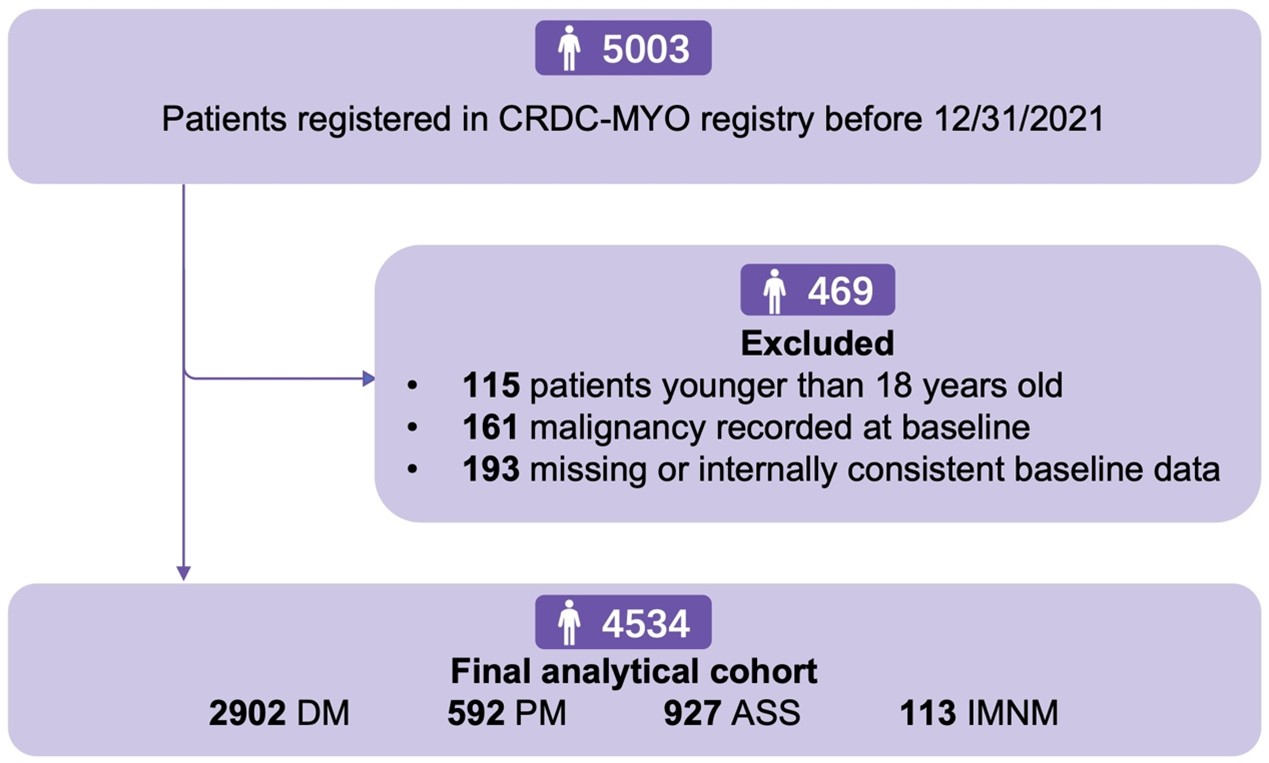Recently, the team led by Director Li Mengtao and Deputy Director Wang Qian of the Department of Rheumatology at PUMCH, in collaboration with multiple centers nationwide, published their latest research findings on PROMIS in the internationally prestigious Journal of the American Academy of Dermatology. PROMIS, short for Prospective Registry Of MyositIS (PROMIS), is a prospective cohort study of Chinese patients with idiopathic inflammatory myopathies (IIM). The study systematically analyzed long-term outcomes in 4,534 Chinese patients with IIM, and for the first time revealed patterns of major adverse outcome changes across different disease stages. The research elucidated significant prognostic differences among clinical subtypes characterized by different myositis-specific antibodies, providing new evidence for risk assessment, follow-up monitoring, and individualized management strategies for this disease. It also offers important references for optimizing international disease classification and clinical management guidelines.
Idiopathic inflammatory myopathies (IIM) are a heterogenous group of complex systemic autoimmune diseases, primarily including dermatomyositis (DM), polymyositis (PM), anti-synthetase syndrome (ASS), and immune-mediated necrotizing myopathy (IMNM), among other subtypes. Besides muscle inflammation, patients commonly present with multisystem manifestations including rash, arthritis, interstitial lung disease, and cardiac involvement. Despite advancements in medical care in recent years, the overall prognosis of this disease remains suboptimal.
This is the largest Chinese prospective IIM study with the longest follow-up published to date, and the first study worldwide to conduct a comprehensive prognostic analysis of multiple IIM subtypes across different disease stages. The research was built upon the prospective IIM cohort established through the Chinese Rheumatism Data Center (CRDC), covering 198 medical centers across 32 provinces, autonomous regions, and municipalities nationwide. It enrolled a total of 4,534 patients (DM 64.0%, PM 13.1%, ASS 20.4%, IMNM 2.5%).

The study quantified long-term outcomes and risk levels of IIM patients nationwide. Data showed that the 10-year cumulative survival rate for IIM patients was 80.5%, with ASS having the best prognosis and DM the worst.
The study systematically revealed, for the first time, the patterns of adverse outcome changes in IIM patients across different stages. In the early stage (within 3 years of onset), interstitial lung disease and infection-related risks were higher, while in later stages, malignancy and cardiovascular events predominated. Different myositis-specific antibodies demonstrated distinct prognostic differences: patients with anti-MDA5 antibodies had the highest risk in the early stage, patients with anti-TIF1γ antibodies showed increased risk in later stages, while those with anti-synthetase antibodies had generally more favorable outcomes. Male, lymphopenia, high serum ferritin, and anti-MDA5, anti-TIF1γ and anti-Ro52 antibodies were risk factors for unfavorable prognosis, while anti-Jo-1 antibody was associated with better survival. This suggests that antibody-based stratification can help optimize follow-up and intervention strategies.
The study was supported by the National Key R&D Program and the National High Level Hospital Clinical Research Funding, among others. Director Li Mengtao and Deputy Director Wang Qian of the Department of Rheumatology at PUMCH are co-corresponding authors, and attending physician Yu Chen, chief physician Wu Chanyuan, and attending physician Jin Shangyi are co-first authors.
Written by and pictures courtesy of the Department of Rheumatology
Edited by Fu Tanping and Chen Xiao
Chief editor Duan Wenli
Supervised by Wu Peixin
